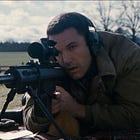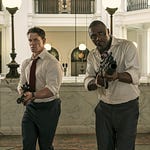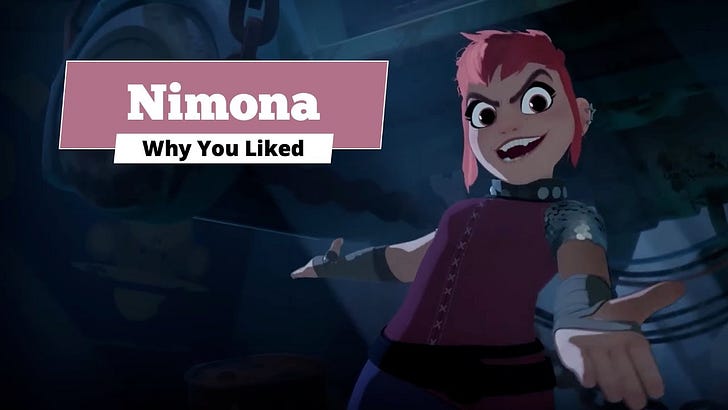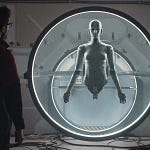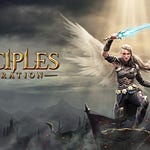You know that old saying: the only certainties in life are death and taxes. Well, in 2016, The Accountant suggested a third: that the man handling your taxes might also be handling your death.
The sequel, The Accountant 2, asks an even bolder question: what happens when that same man has to file a joint return... on justice? It turns out family reconciliation is a lot like auditing a cartel's finances: messy, dangerous, and someone's probably going to end up in a freezer.
Aren’t family reunions best tackled by teaming up to dismantle a human trafficking ring? No? Just the Wolff brothers? The Accountant 2 throws conventional family bonding out the window and replaces it with the kind of quality time that comes with a shared love of righteous vengeance.
Let’s back up.
A Different Kind of Partnership
You remember The Accountant. It follows Ben Affleck’s Christian Wolff, a solitary and singular genius who helps the little guy find vengeance against the IRS. He also moonlights as a book cooker for the cartels and runs a side hustle as the Angel of Death, wreaking vengeance on the unworthy. Christian’s an action hero with autism spectrum disorder, and pity the fool who calls him disabled. The original film was a hallmark of epic storytelling, giving us a movie where the one-in-five who identify as neurodivergent can see themselves reflected by big name Ben Affleck.
Since we’ve already solved the problem of whether an autistic person can be a hero (they totally can) we’re presented with a different quandary. Can he be a good brother?
The Accountant 2 isn’t just another action sequel. It’s a deep, engaging exploration of reconciliation wrapped in a boys’ road trip and tied up with a body count bow. Its central theme is that for some, reconciliation is a calculation.
The Fantasy vs. The Reality
A central pillar of the 2016 original film was that Christian was a high-functioning autistic man. Capable and gifted, but eminently human. There’s a subtle shift in the sequel because it introduces pure sorcery from the Institute.
See, the Harbor Neuroscience Institute still exists in the sequel, but now its patients have ascended to fantastic heights unequalled by magical heroes in The Lord of the Rings. It’s a bizarre flex for a series that started with such a mindful and respectful investigation of people with autism spectrum disorder. It gave me a bit of a head-turn initially until I worked out why they take this route in the sequel.
The Institute is used as a sort of hacker collective, a group of highly talented savants extending the abilities of the original film’s Justine. Justine now has a coterie of hacker witches and warlocks who serve as a plot device to accelerate the story. This comes at a cost: it sacrifices some of the original film’s “this could be real” grit that made its representation so powerful.
However, I can overlook it without breaking down, because director Gavin O’Connor uses this as a deliberate choice to switch the franchise into a more conventional, fast-paced action movie. It took ages for the original to get enough cult status to greenlight a sequel, and if it takes a little hand-wavium to get this amazing story of underrepresented heroes out there, I’m sleeping easy.
What helps me sleep even better is that The Accountant 2 remains grounded in the emotional reality of its two leads, Christian and Braxton. The fantasy gets them from A to B, but the journey is what matters. It’s a conceit we wished Tolkien had used: get Sam and Frodo to Mount Doom on eagles instead of making them climb all that fucking way.
And you at the back, shouting that the climb was the journey that mattered: they’d already gone such a long way, my dude. Let them catch the bus that one last stop.
The Duality of Brothers: A Symbiotic Relationship
Fans of The Accountant will remember Jon Bernthal’s Braxton, Christian’s maybe-sociopathic brother. The Accountant 2 allows Christian to humanise Braxton’s sociopathy in the same way Braxton humanises Christian’s neurodivergence.
There’s an early scene in the movie with Marybeth Medina. She’s working the central plot problem of assassinated agent Ray King with Christian and Braxton. Marybeth highlights that a huge number of people have been murdered by human trafficking rings, and Braxton says they weren’t all killed by the traffickers. The intent is clear: he’s playing for points, for superiority in a social situation, and Marybeth nopes the hell out of there. She’s still law enforcement, and she can’t work with psychos.
Christian understands that Braxton has needs. He doesn’t really know what’s going on here, but Christian follows Braxton’s play. It’s a unique form of loyalty, backing someone when you don’t understand the game, the rules, or how to win, but Christian understands one thing really well: Braxton is his brother. He sets off after Marybeth, but not to apologise for Braxton. He just wants her on the team.
Then there’s another scene where the brothers are at a bar. Braxton thinks he’s there to help Christian with social interactions with The Girl™. Christian thinks he’s there to help Braxton satisfy his need for destruction (say, a bar fight). They understand each other’s unspoken needs because their communication is more primal. It goes beyond the limitations of normal or neurodivergent speech and into a lived history of two people who know each other better than they know themselves.
There’s a clear lesson for the audience in here. Braxton’s there to deliver a recipe of sorts for connection with neurodivergent people. The film doesn’t shy away from the difficulties of people who are such different communicators, but it also doesn’t shy away from the possibilities that result. O’Connor gets Christian and Braxton to just fucking talk to each other, even when it’s clumsy.
The Accountant 2 argues that direct and honest conversation between people is the key, even if it’s difficult. And thank God it does, because it leads to some dope-ass action scenes.
Action as Conversation
I read a how-to-write book eons ago that had a chapter titled, Combat as Conversation. The argument is that action by itself is relatively boring, and action scenes should be a form of conversation - either a character is learning about themselves, challenging an enemy, learning about a friend, and so on. You can probably immediately picture five truly epic action scenes that fit this mould.
The Accountant 2 leans heavily into this. First, there’s the fighting style that Christian and Braxton use. They have that strong nonverbal communication we’ve touched on already. They don’t need words. Their trust is demonstrated physically. Every gunshot, every blow, every move to cover and every pincer movement is delivered by two highly skilled masters who’ve known each other their entire lives.
There’s also the framing the film uses. In quiet moments, Christian and Braxton rarely face each other. They talk pastone another. In the action, they are shoulder-to-shoulder, a single, cohesive unit. The action is more than spectacle: it’s the language they both speak most fluently.
Christian and Braxton’s shared competence in violence is the foundation of the trust they need to build their emotional connection. The action proves to them - and to us in the audience - their reliability with each other. It’s what makes those quieter, harder conversations possible.
A Mission of Justice
The villain of the movie is some guy named Burke, and he doesn’t really matter. In a smart narrative choice, the movie decentres him, because there’s money-based human trafficking, something something, vengeance.
This film isn’t a whodunnit like the first. The motivations are more personal: the real hook is justice for Ray King. The mission has more emotional weight than finding the lost millions in Excel. Christian knew Ray was a good man and, more importantly, a good father. Christian’s motivation is duty to his memory.
Braxton’s motivation is simpler and more powerful: loyalty to Christian.
Braxton is a 40-proof psycho, a killer with a charming smile, a man with a sugar addiction and a kill count that would make a ranked Call of Duty player envious. He knows he’s a bad man, and during this film, we see his struggles to either justify it or to bridge the gap in himself. Whether it’s explaining why he’s really misunderstood to the single survivor of one of his massacres or his quest to own a puppy, he’s compensating.
He thinks it’s because of this evil in his soul that Christian - the good one, the honour-bound soldier, the servant of duty - won’t talk to him. And so when he’s called, he comes. Braxton needs Christian for a connection back to goodness, just as Christian needs Braxton to help navigate those messy human situations.
This is where we meet Anaïs. She’s a bounty hunter, an assassin with top skills and a John Wick reputation. Anaïs is used to demonstrate that neurodivergence isn’t a monolith: where Christian has autism spectrum disorder, she has acquired savant syndrome. The film doesn’t present one as better than the other; it uses their shared difficulties with the world to highlight how wide a spectrum of difference humanity can celebrate.
Anaïs’s arc provides a path to redemption, echoing the brothers’ journey toward a better version of themselves. She might not want to go on their road trip, but that doesn’t mean she doesn’t have a destination in mind.
The Final Calculation
In a detail-free way, the final moments of this movie answer the questions of connection that Braxton’s been asking. Christian has listened. He’s never not listened, but he hasn’t known how to answer.
Now, he does. Braxton’s clarity and their shared time on this murder spree let them connect more deeply in the final ten minutes than was possible in the first movie’s recounting of their troubled childhood. It doesn’t matter that Braxton’s still got issues or that Christian’s connection is a calculation. Christian Wolff has stepped into the territory of the emotional unknown. It’s not that the film is magicking away his autism spectrum disorder and saying he understands Braxton. But it does show that he understands that Braxton has needs.
Braxton’s joy isn’t in the perfection of the gesture, but in the effort. He is finally seen and recognised as the brother he’s always tried to be.
The Accountant 2 leaves us with some homework. Love and support don’t always look like flowers or birthday phone calls. Sometimes it looks like a calculated effort to bridge an impossible gap. It doesn’t matter if you have to turn up on your own terms. It matters that you’ve decided the other person is worth the calculation.
What did you think of The Accountant 2? If it left you pining to adopt a wasteland cat, click that Like button. If you immediately wanted a siblings-only road trip…





